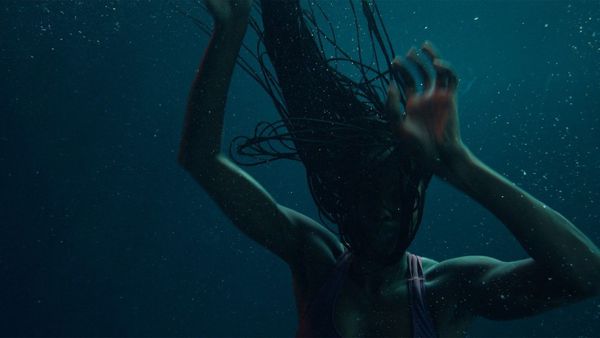Eye For Film >> Movies >> Nanny (2022) Film Review
Nanny
Reviewed by: Amber Wilkinson

This atmospheric story from Nikyatu Jusu blends African folklore with more domestic themes to explore the anxieties and anger of undocumented nanny in New York. And while Jusu may show signs of first-time feature-maker wobbles in terms of making the reality of the everyday fully gel with the film's more supernatural elements, she announces herself as a name to watch by creating both worlds with attention to detail and character. She also shows an enviable talent for achieving her chill factor by physical means rather than a heavy reliance on CGI.
Jusu sets the tone in the first minutes when we see a spider crawling up the face of Senegalese migre Aisha (Anna Diop) in the night as she sleeps in New York. This liminal space between one day and the next is where many of the otherworldly happenings of Jusu's story will manifest themselves but the idea of living in the spaces between one place or state and another runs throughout the film.

Aisha has just scored a job as a nanny for six-year-old Rose (Rose Decker), which will include "occasional" sleepovers at the swanky Tribeca apartment the youngster shares with her office worker mum Amy (Michelle Monaghan) and photojournalist dad Adam (Morgan Spector). Aisha's bedroom at home is full of sunlight shades, whereas this one in Tribeca is imbued with the cool blues of water that will also come to take on a key role in the film - orange here is confined to clothing and a disturbing photo of a man shot in front of a blazing fire that hangs in Adam's office. The lighting used by cinematographer Rina Yang - some of the best I can recall in an American independent film since Moonlight - also deserves special mention, with Diop's skin almost seeming to glow from the inside when shot in the golden hour or shimmer with blue when she's in the water.
Like many nannies before her, life is a trade off for Aisha - caring for a child that is not her own while her own son Lamine waits with his auntie (Olamide Candide-Johnson) in Senegal until she gets the money together to bring him to the States. And while Amy and Adam might seem like a pair who would check their privilege, they like their apartment have a deceptively shiny surface and still rule Aisha's life, not just in terms of the things they instruct her to do, but in their unpredictable hours and, worse, their unpredictable payment of her overtime. Aisha may be a victim of circumstance on some level but she is certainly not portrayed as helpless. Diop's robust but haunted performance shows she is capable and smart and yet still, somehow, in over her head - a metaphor that takes physical form at a local pool where she encounters a mermaid ready to drag her under. This is Mami Wata, a water spirit with a potential for malevolence, who along with African trickster Anansi, most frequently depicted as a spider, will come to haunt Aisha's dreams and her waking hours.
These supernatural encounters are visually immersive but more scary for Aisha than a viewer of the film, who is more likely to be unsettled by the tiny daily injustices and constant microaggression Aisha comes up against, although Jusu indicates that Amy, though clearly in a better position than Aisha, is also caught in a liminal world between work and home as jealousy over her nanny's bond with her daughter grows. It's a shame a subplot involving a romantic liaison with Amy and Adam's doorman (Sinqua Walls - more film roles for him, please), and chats with his clairvoyant gran (Leslie Uggams), which sap tension from the main narrative, weren't saved up for a film all of their own, as Jusu shows an entirely different set of skills, bringing joy and heat to their encounters. This is another world Jusu is inviting us to step into, which even if the balance between the two is uneven, is every bit as detailed as the last, and I'll certainly be looking out for the next one she creates.
Reviewed on: 24 Jan 2022
















